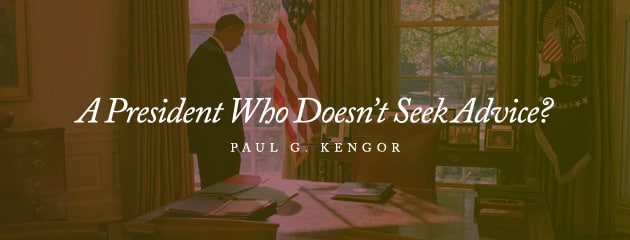
The Government Accountability Institute reports that President Obama continues to skip the majority of his Presidential Daily Briefings. This is a stunning fact, first reported two years ago and now updated and reconfirmed. Worse, it was also just reported that Obama likewise doesn’t consult his White House predecessor. Altogether, this paints a very troubling picture.
To recap: In September 2012, the Government Accountability Institute released a study which revealed that our president failed to attend a single Presidential Daily Brief (PDB) in the week leading up to the anniversary of 9/11, despite major eruptions in the Arab world, and despite the obvious fact that we were approaching another 9/11 anniversary (i.e., the highest level of security alert). And yet, President Obama didn’t attend a single briefing that week. In fact, Obama attended only 43.8 percent of his Daily Briefs in the first 1,225 days of his administration. For the year 2012, he attended a little over a third.
This is outrageous, unacceptable for any president. It’s not only unwise from a national-security standpoint but also politically, especially for a president often criticized for spending too much time vacationing and campaigning and dashing for the golf course and fundraisers immediately after beheadings and aircraft downings.
So, that was bad enough. Apparently, however, the problem continues. The Government Accountability Institute has now updated its report and found that President Obama has missed over half the briefings in his second term, obviously learning little (literally) since the first. The man has skipped hundreds of daily briefings. These revelations come amid stinging criticisms of Obama’s methods by former top administration officials, including Leon Panetta, Robert Gates, and others.
By comparison, President George W. Bush not only didn’t miss the PDB but actually expanded it to six meetings per week.
Speaking of Bush, the former president was recently interviewed by Brian Kilmeade of Fox News. Here we learned that Obama apparently never calls Bush for advice. “[Bush] said he has not heard from President Obama except when the president called with the news that [Osama] bin Laden had been killed,” reported Fox. Bush told Kilmeade: “He has not [called] on a regular basis, which is OK. It doesn’t hurt my feelings. It’s a decision he has made. Presidents tend to rely on the people they’re close to … and I understand that.”
Bush was gracious. And from what I can tell from my research, what he said is accurate. Obama does not consult his predecessor.
Fox added that Bush said “that he used to speak with his predecessor, Bill Clinton, regularly while in office.”
Of course, he did. All sitting presidents speak with and consult former presidents. That’s what they do. They do so at least as a courtesy and at best as a necessity. The guy who held the Oval Office job before you has valuable perspective. If Obama had contacted George W. Bush on Iraq, he might have heard something particularly useful, especially given how badly he has botched the situation by prematurely pulling U.S. troops and smoothing the way for ISIS.
Indeed, at a White House press conference on July 12, 2007, Bush said that withdrawing from Iraq prematurely “would mean surrendering the future of Iraq” and “would mean that we’d be risking mass killings on a horrific scale. It would mean we’d allow the terrorists to establish a safe haven in Iraq to replace the one they lost in Afghanistan. It would mean increasing the probability that American troops would have to return at some later date to confront an enemy that is even more dangerous.”
That’s exactly what happened. Bush predicted it precisely. It’s for such reasons that sitting presidents take the time to regularly consult former presidents. It’s a time-honored tradition. For an excellent and lengthy account, check out the book “The Presidents Club” by veteran Time writers Michael Duffy and Nancy Gibbs. It features paragraph upon paragraph and page after page of presidents consulting other presidents. Their chapters are long, though the revised edition will surely have a relatively short chapter on the current president.
So, why is this? Why does our current president not consult his predecessor or even the daily experts there to be consulted every day in his PDB? I realize that Obama’s defenders on the left are contemptuous of George W. Bush, but they can’t blithely dismiss the trained, educated, and experienced cast of professional military and intelligence experts who are there to be tapped.
Why does this president seem to disregard such advice?
It’s a troubling question that inevitably goes to the man’s personality and psychology. In that respect, I don’t know enough and could only speculate. But I do know this much: President Obama’s dismissal of such advice clearly shows in his foreign policy.

